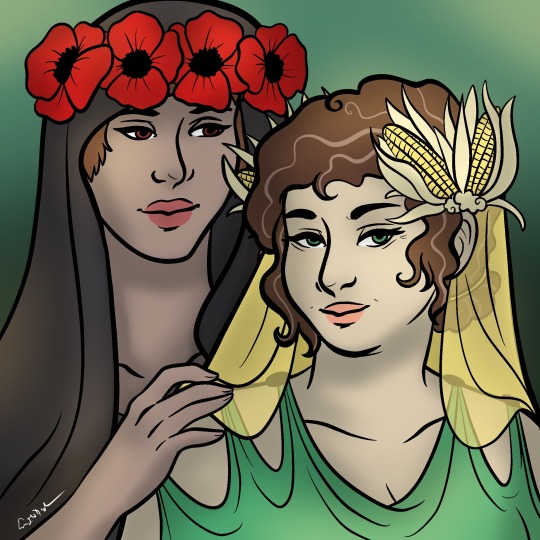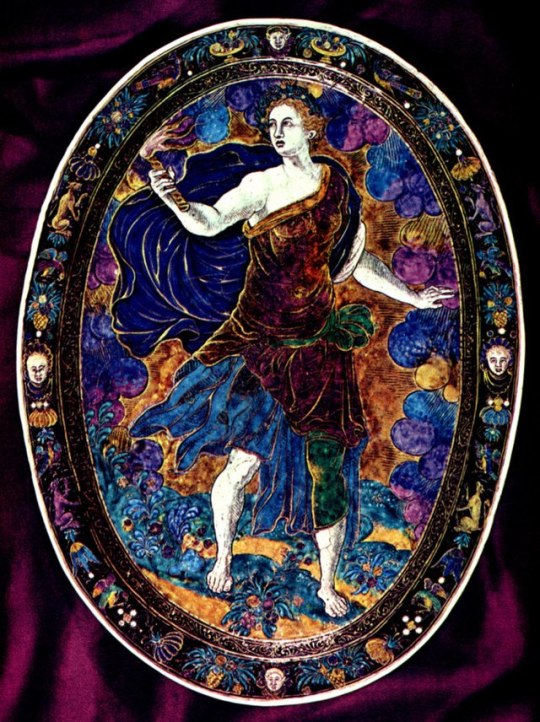#Demeterdeity
Text
“Medusa deserved better”
More like Demeter deserves better
232 notes
·
View notes
Note
hey! i've been reading about the judges of the dead and i've seen triptolemos be mentioned as the judge presiding over the initiates of the mysteries but i'm having trouble finding sources. do you know if he was officially considered a judge or not? thanks!
Hi! As far as I know, the only mention of Triptolemus being a judge comes from Plato, in Apology 41a:
|41a If, when someone arrives in the world of Hādēs, he is freed from those who call themselves jurors [dikastai] here, and finds the true [alētheîs] judges [dikastai] who are said to give judgment [dikazein] over there [ekeî]—Minos and Rhadamanthus and Aiakos and Triptolemos, and other demigods [hēmi-theoi] who were righteous [dikaioi] in their own life—that would not be a bad journey [apo-dēmiā], now would it? To make contact with Orpheus and Musaeus and Hesiod and Homer—who of you would not welcome such a great opportunity? Why, if these things are true [alēthē], let me die again and again.
Dr. Patrick Hunt has an article published here on the passage that might be relevant to your research as well.
More generally on the topic, Jan N. Bremmer says this in Initiation into the Mysteries of the Ancient World (go grab it, it's in open access):
The connection of Eleusis with agriculture is also manifest in the equally prominent position in Eleusis of Triptolemos, the inventor of agriculture, who only in the fourth century becomes a judge in the underworld, and by the presence on a fourth-century Apulian vase of personified Eleusis sitting next to Eniautos, ‘(The products of the) Year’, holding a horn of plenty that sprouts ears of wheat.
Which is an interesting comment because it also lines up with a change in his cult in Athens at the same period, as indicated by Isabelle K. Raubitschek and Antony E. Raubitschek in The Mission of Triptolemos:
The transformation of Triptolemos from an instructor of the Athenian farmers in the art of agriculture into a hero, charged by Demeter to spread the knowledge of farming throughout the world, took place, according to the vases illustrating this mission, between 510 and 480 B.C., when renewed activity is attested both in Eleusis and in the Eleusinion in Athens. This propaganda effort with its emphasis on the Mission of Triptolemos beyond the borders of Attica may be connected with the claims of the newly founded Athenian democracy to be the mother city of all the Ionians.
Which leads to comment on the difficulty of officiality in ancient Greek religion. There is no direct mention of Triptolemus as a judge outside of Plato in the sources we know of that I could find, but his story otherwise predates the 5th century by far. Everything here seems to indicate a shift in worship that attributed this new role to him in Athenian context. And from that point on, it's possible that the idea of him as a judge spread across Greece through the cultural impact of Athens.
To add to uncertainty, we do not know enough of the specifics of his cult within the Eleusinian Mysteries to know if there was an evolution in his role during the mysteries themselves.
Before I wrap this up, just a headsup that the most important study (to date) on Triptolemus was written by Gerda Schwarz in 1987. It was never translated from German and I couldn't find a copy online but I noticed that the German Wikipedia page is more detailed as a result of that work being in the bibliography.
16 notes
·
View notes
Text
I like to rise when the sun she rises
Early in the morning
And I like to hear them small birds singing
Merrily upon their laylums
And hurrah for the life of a country boy
And to ramble in the new mowed hay
Happy Thesmophoria
#missed day 1 cause exams and most of day 2 but shh#the song is country life by the watersons in case anyone was curious#hellenic polytheism#demeter deity#demeterdeity#helpol#thesmophoria
5 notes
·
View notes
Note
i want to know the original version of hades and persephone story. there are so many versions I've read and i wanted to know which one do you believe in or which one do you think is the real one?
Okay so to start with. If we wanna really go back, Hades came into existence after Persephone. But alas, we aren't speaking of this version.
We are talking about the version where Hades sweeps Persephone away without so much as a hello.
The problem is a lot of the stories of Ancient Greece are well... They're lost. They were primarily shared through oral tradition, and written down over time. And so many stories we may not know. On top of that, many that were written down were lost, destroyed or just vanished, to time. Plus, we don't know how to translate Linear A, but we do Linear B, and there may be a version somewhere in Linear A. Overall, it's just possible we don't know the earlier versions.
But the earliest version we do have is from the Homeric Hymn, from the 7th or 6th B.C.E. This hymn is actually one to Demeter, not Hades or Persephone. The myth, while speaking of the two, is actually about Demeter.
It is, for the time period it is from (and you must keep in mind the culture of the time to understand the myth) a feminist myth.
So the culture of the time.
In the time period women did not have the greatest of rights, something improved upon today, but it means that the Father (and/or King) had full rights to hand their daughters off to another man.
That is what happens in this myth, Zeus tells Hades he may have Persephone's hand... But Persephone did not wish to go. And likewise Demeter was not informed.
By the culture of the time that does not matter, but Demeter *makes* it matter. She searches for her daughter first, then when she discovers where Persephone was taken and who was the cause (Zeus) she is angered.
Demeter then refuses to step upon Olympus, not allow any plants to grow, until she sees her daughter again.
This is obviously a problem, so Zeus sends Hermes down to retrieve Persephone (who btw was unhappy and missed her mom). Persephone leaps up with joy to see her mother again and Hades agrees immediately. But he secretly feeds her pomegranate seeds just to be sure she would return.
The reason this is a feminist myth is because of Demeter, because she refused to accept her king and her daughter's father handing their daughter off in marriage. And she refused to such an extent that they had no choice but to compromise with her (and had Hades not forced Persephone to have the pomegranate seed she wouldn't have even had to compromise).
For the culture of the time, Zeus and Hades were taking actions that were more than okay, nothing they did would be considered wrong. But Demeter stood against it.
Demeter stood for her daughter to not be married off, and demanded she be returned, and Persephone (tho she came to love Hades) was relieved to return to her mother.
Many of the "new adaptions" have Persephone wanting to leave Demeter, wanting to be with her husband, and Demeter being overbearing. But originally it was mutual love, Mother and Daughter missing each other and the Mother fighting to get her daughter back when everything of the time said she had no right to.
And so the myth as we know occurs. This is the myth I ascribe too, being the oldest we have, and I do wish more realized how Demeter's actions are why the myth is so important.
I have copied the Hymn in it's entirety below the cut. It is fairly long and four parts. If you have questions about it, feel free to ask!
Homeric Hymn 2 to Demeter (abridged) (trans. Evelyn-White) (Greek epic C7th or 6th B.C.) :
I. HAIDES ABDUCTS PERSEPHONE
"[Demeter's] trim-ankled daughter whom Aidoneus [Haides] rapt away, given to him by all-seeing Zeus the loud-thunderer. Apart from Demeter, lady of the golden sword and glorious fruits, she was playing with the deep-bosomed daughters of Okeanos and gathering flowers over a soft meadow, roses and crocuses and beautiful violets, irises also and hyacinths and the narcissus, which Gaia (the Earth) made to grow at the will of Zeus and to please Polydektor (Host of Many), to be a snare for the bloom-like girl--a marvellous, radiant flower. It was a thing of awe whether for deathless gods or mortal men to see: from its root grew a hundred blooms and it smelled most sweetly, so that all wide heaven (ouranos) above and the whole earth (gaia) and the sea's (thalassa) salt swell laughed for joy. And the girl was amazed and reached out with both hands to take the lovely toy : but the wide-pathed earth yawned there in the plain of Nysa, and the lord, Polydegmon (Host of Many) [Haides], with his immortal horses sprang out upon her--the Son of Kronos (Cronus), Polynomos (He Who has Many Names).
He caught her up reluctant on his golden car and bare her away lamenting. Then she cried out shrilly with her voice, calling upon her father [Zeus], the Son of Kronos, who is most high and excellent. But no one, either of the deathless gods or mortal men, heard her voice, nor yet the olive-trees bearing rich fruit: only tender-hearted Hekate (Hecate), bright-coiffed, the daughter of Persaios (Persaeus), heard the girl from her cave, and the lord Helios (the Sun), Hyperion's bright son, as she cried to her father, the Son of Kronos. But he was sitting aloof, apart from the gods, in his temple where many pray, and receiving sweet offerings from mortal men. So he [Haides], that Son of Kronos, Polynomos (Of Many Names), Polysemantor (Ruler of Many) and Polydegmon (Host of Many), was bearing her away by leave of Zeus on his immortal chariot--his brother's child and all unwilling.
And so long as she, the goddess, yet beheld earth and starry heaven and the strong-flowing sea where fishes shoal, and the rays of the sun, and still hoped to see her dear mother and the tribes of the eternal gods, so long hope clamed her great heart for all her trouble . . . and the heights of the mountains and the depths of the sea ran with her immortal voice : and her queenly mother heard her.
II. DEMETER SEARCHES FOR PERSEPHONE
"Bitter pain seized her [Demeter's] heart, and she rent the covering upon her divine hair with her dear hands : her dark cloak she cast down from both her shoulders and sped, like a wild-bird, over the firm land and yielding sea, seeking her child. But no one would tell her the truth, neither god nor mortal man; and of the birds of omen none came with true news for her. Then for nine days queenly Deo wandered over the earth with flaming torches in her hands, so grieved that she never tasted ambrosia and the sweet draught of nektaros, nor sprinkled her body with water. But when the tenth enlightening dawn had come, Hekate, with a torch in her hands, met her, and spoke to her and told her news : ‘Queenly Demeter, bringer of seasons and giver of good gifts, what god of heaven (theon ouranion) or what mortal man has rapt away Persephone and pierced with sorrow your dear heart? For I heard her voice, yet saw not with my eyes who it was. But I tell you truly and shortly all I know.’
So, then, said Hekate. And [Demeter] the daughter of rich-haired Rheia answered her not, but sped swiftly with her, holding flaming torches in her hands. So they came to Helios (the Sun), who is watchman of both gods and men, and stood in front of his horses: and the bright goddess enquired of him : ‘Helios, do you at least regard me, goddess as I am, if ever by word or deed of mine I have cheered your heart and spirit. Through the fruitless air (aitheros) I heard the thrilling cry of my daughter whom I bare, sweet scion of my body and lovely in form, as of one seized violently; though with my eyes I saw nothing. But you--for with your beams you look down from the bright upper air (aitheros) over all the earth and sea--tell me truly of my dear child if you have seen her anywhere, what god or mortal man has violently seized her against her will and mine, and so made off.’
So said she. And the Son of Hyperion [Helios] answered her : ‘Queen Demeter, daughter of rich-haired Rheia, I will tell you the truth; for I greatly reverence and pity you in your grief for your trim-ankled daughter. None other of the deathless gods is to blame, but only cloud-gathering Zeus who gave her to Aides, her father's brother, to be called his buxom wife. And Aides seized her and took her loudly crying in his chariot down to his realm of mist and gloom. Yet, goddess, cease your loud lament and keep not vain anger unrelentingly : Aidoneus Polysemantor (Ruler of Many) is no unfitting husband among the deathless gods for your child, being your own brother and born of the same stock: also, for honour, he has that third share which he received when division was made at the first, and is appointed lord of those among whom he dwells.’
So he spake, and called to his horses: and at his chiding they quickly whirled the swift chariot along, like long-winged birds. But grief yet more terrible and savage came into the heart of Demeter, and thereafter she was so angered with [Zeus] the dark-clouded Son of Kronos that she avoided the gathering of the gods and high Olympos. She [Demeter] vowed that she would never set foot on fragrant Olympos nor let fruit spring out of the ground until she beheld with her eyes her own fair-faced daughter.
III. THE RETURN OF PERSEPHONE
"Now when all-seeing Zeus the loud-thunderer heard this, he sent Argeiphontes [Hermes] whose wand is of gold to Erebos, so that having won over Aides with soft words, he might lead forth chaste Persephoneia to the light from the misty gloom to join the gods, and that her mother might see her with her eyes and cease from her anger. And Hermes obeyed, and leaving the house of Olympos, straightway sprang down with speed to the hidden places of the earth. And he found the lord Aides in his house seated upon a couch, and his shy mate with him, much reluctant, because she yearned for her mother. But she was afar off, brooding on her fell design becuase of the deeds of the blessed gods. And strong Argeiphontes [Hermes] drew near and said : ‘Dark-haired Aides, ruler over the departed, father Zeus bids me bring noble Persephone forth from Erebos unot the gods, that her mother may see her with her eyes and cease from her dread anger with the immortals; for now she plans an awful deed, to destroy the weakly tribes of earth-born men by keeping seed hidden beneath the earth, and so she makes an end of the honours of the undying gods. For she keeps fearful anger and does not consort with the gods, but sits aloof in her fragrant temple, dwelling in the rocky hold of Eleusis.’
So he said. And Aidoneus, ruler over the dead, smiled grimly and obeyed the behest of Zeus the king. For he straightway urged wise Persephone, saying : ‘Go now, Persephoneia, to your dark-robed mother, go, and feel kindly in your heart towards me : be not so exceedingly cast down; for I shall be no unfitting husband for you among the deathless dods, that am own brother to father Zeus. And while you are here, you shall rule all that lives and moves and shall have the greatest rights among the deathless gods : those who defraud you and do not appease your power with offerings, reverently performing rites and paying fit gifts, shall be punished for evermore.’
When he said this, wise Persephoneia was filled with joy and hastily sprang up for gladness. But he on his part secretly gave her sweet pomegranate seed to eat, taking care for himself that she might not remain continually with grave, dark-robed Demeter. Then Aidoneus Polysemantor (Ruler of Many) openly got ready his deathless horses beneath the golden chariot. And she mounted on the chariot, and strong Argeiphontes [Hermes] took reins and whip in his dear hands and drove forth from the hall, the horses speeding readily. Swiftly they traversed their long course, and neither the sea nor river-waters nor grassy glens nor mountain-peaks checked the career of the immortal horses, but they cleft the deep air above them as they went. And Hermes brought them to the place where rich-crowned Demeter was staying and checked them before her fragrant temple.
And when Demeter saw them, she rushed forth as does a Mainas (Maenad) down some thick-wooded mountain, while Persephone on the other side, when she saw her mother's sweet eyes, left the chariot and horses, and leaped down to run to her, and falling upon her neck, embraced her. But while Demeter was still holding her dear child in her arms, her heart suddenly misgave her for some snare, so that she feared greatly and ceased fondling her daughter and asked of her at once : ‘My child, tell me, surely you have not tasted any food while you were below? Speak out and hide nothing, but let us both know. For if you have not, you shall come back from loathly Aidao and live with me and your father [Zeus], the dark-clouded Son of Kronos and be honoured by all the deathless gods; but if you have tasted food, you must fo back again beneath the secret places of the earth, there to dwell a third part of the seasons every year: yet for the tow parts you shall be with me and the other deathless gods. But when the earth shall bloom with the fragrant flowers of spring in every kind, then from the realm of darkness and gloom thou shalt come up once more to be a wonder for gods and mortal men. And now tell me how he rapt you away to therealm of darkness and gloom, and by what trick did strong Polydegmon (Host of Many) [Haides] beguile you?’
Then beautiful Persephone answered her thus : ‘Mother, I will tell you all without error. When luck-bringing Hermes came, swift messenger from my father the Son of Kronos and the other Sons of Ouranos, bidding me come back from Erebos that you might see me with your eyes and so cease from your anger and fearful wrath against the gods, I sprang up at once for joy; but he secretly put in my mouth sweet food, a pomegranate seed, and forced me to taste against my will. Also I will tell how he rapt me away by the deep plan of my father [Zeus] the Son of Kronos and carried me off beneath the depths of the earth, and will relate the whole matter as you ask. All we were playing in a lovely meadow, Leukippe and Phaino and Elektra and Ianthe, Melite also and Iakhe with Rhodea and Kallirhoe and Melobosis and Tykhe and Okyrhoe, fair as a flower, Khryseis, Ianeira, Akaste and Admete and Rhodope and Plouto and charming Kalypso; Styx too was there and Ourania and lovely Galaxaure with Pallas who rouses battles and Artemis delighting in arrows: we were playing and gathering sweet flowers in our hands, soft crocuses mingled with irises and hyacinths, and rose-blooms and lilies, marvellous to see, and the narcissus which the wide earth caused to grow yellow as a crocus. That I plucked in my joy; but the earth parted beneath, and there the strong lord, Polydegmon (Host of Many) [Haides] sprang forth and in his golden chariot he bore me away, all unwilling, beneath the earth : then I cried with a shrill cry. All this is true, sore though it grieves me to tell this tale.’
So did they then, with hearts at one, greatly cheer each the other's soul and spirit with many an embrace: their hearts had relief from their griefs while each took and gave back joyousness. Then bright-coiffed Hekate came near to them, and often did she embrace the daughter of holy Demeter: and from that time the lady Hekate was minister and companion to Persephone.
IV. GIFT OF AGRICULTURE & THE ELEUSINIAN MYSTERIES
"And all-seeing Zeus sent a messenger to them, rich-haired Rheia, to bring dark-cloaked Demeter to join the families of the gods (phyla theon) : and he promised to give her what rights she should choose among the deathless gods and agreed that her daughter should go down for the third part of the circling year to darkness and gloom, but for the two parts should live with her mother and the other deathless gods. Thus he commanded. And the goddess did not disobey the message of Zeus; swiftly she rushed down from the peaks of Olympos and came to the plain of Rharos, rich, fertile corn-land once, but then in nowise fruitful, for it lay idle and utterly leafless, because the white grain was hidden by design of trim-ankled Demeter. But afterwards, as spring-time waxed, it was soon to be waving with long ears of corn, and its rich furrows to be loaded with grain upon the ground, while others would already be bound in sheaves. There first she landed from the fruitless upper air (aitheros) : and glad were the goddesses to see each other and cheered in heart. Then bright-coiffed Rheia said to Demeter : ‘Come, my daughter; for far-seeing Zeus the loud-thunderer calls you to join the families of the gods, and has promised to give you what rights you please among the deathless gods, and has agreed that for a third part of the circling year your daughter shall go down to darkness and gloom, but for the two parts shall be with you and the other deathless gods: so has he declared it shall be and has bowed his head in token. But come, my child, obey, and be not too angry unrelentingly with the dark-clouded Son of Kronos; but rather increase forthwith for men the fruit that gives them life.’
So spake Rheia. And rich-crowned Demeter did not refuse but straightway made fruit to spring up from the rich lands, so that the whole wide earth was laden with leaves and flowers.
Then she [Demeter] went to [the leaders of Eleusis] . . . she showed them the conduct of her rites and taught them all her mysteries . . . awful mysteries which no one may in any way transgress or pry into or utter, for deep awe of the gods checks the voice. Happy is he among men upon earth who has seen these mysteries; but he who is uninitiate and who has no part in them, never has lot of like good things once he is dead, down in the darkness and gloom. But when the bright goddess had taught them all, they went to Olympos to the gathering of the other gods. And there they dwell beside Zeus who delights in thunder, awful and reverend goddesses. Right blessed is he among men on earth whom they freely love: soon they do send Ploutos (Plutus, Wealth) as guest to his great house, Ploutos who gives wealth to mortal men.
And now . . . queen Deo, be gracious, you and your daughter all beauteous Persephoneia, and for my song grant me heart-cheering substance."
#demeterdeity#demeter deity#persephone deity#persphonedeity#hadesdeity#hades deity#anon asks#life answers#greek mythology#ancient greece#the hymn to demeter#the myth of hades and persphone#hades and persephone#hellenic chat
137 notes
·
View notes
Photo

Ceres by Osmar Schindler
51 notes
·
View notes
Text

#hymn#demeterdeity#demeter#hymn to demeter#hellenismos#hellenic polytheism#paganism#paganblr#winter#devotional writing
6 notes
·
View notes
Photo



[Part 6]
#demeter#poseidon#hestia#demeterdeity#poseidondeity#hestiadeity#demeter deity#poseidon deity#hestia deity#demeter*#poseidon*#hestia*#my post#mine#personal
188 notes
·
View notes
Photo

Was inspired to draw Persephone and Demeter - both of them have been close to my mind lately. Missing my mom a lot since I can't visit her right now.
Hail Demeter, giver of fruits!
Hail Persephone, bringer of justice!
#persephone#demeter#persephonedeity#demeterdeity#devotional art#hellenic polytheism#hellenic pagan#pagan art#illustration
63 notes
·
View notes
Photo

Demeter and Persephone
Greek; Late 5th–4th century BC
Terracotta
** Visit my Links page for my other blogs & Facebook Pages
279 notes
·
View notes
Text
Short intro
🖤 hi, l’m Louison, 29, non-binary, ADHD
🖤 feel free to talk to me in English or in French
🖤 worshipping Apollon, Dionysos, Thanatos
🖤 not yet worshipping Demeter, Hermes and Persephone, but soon I hope
🖤 witchcraft
🖤 arts and crafts
#hellenic polytheism#helpol#hellenic community#witch#witchcraft#apollondeity#dionysosdeity#dionysusdeity#thanatosdeity#demeterdeity#hermesdeity#persephonedeity#apollo#apollodeity#dionysus#dionysos#thanatos#hermes#demeter#persephone
5 notes
·
View notes
Text
“We mothers stand still so our daughters can look back to see how far they've come.”
- The Barbie Movie
#this quote always makes me think of Demeter and Persephone#demeter deity#demeterdeity#demeter#persephone#persephone deity#persephonedeity#demeter and persephone
67 notes
·
View notes
Text
The Adeia - a modern festival to Demeter

Historically, it’s often during times of hardships and crisis that new cults would be established and religious innovations would appear. This one is no different. It’s through discussion with @iliosflower that the idea of creating a new festival, one that would more accurately respond to modern problematics, came to fruition. This is what we’d like to explain in this post and hope that the idea finds an echo, and hopefully, validation from the wider community.
Why? What is it supposed to do?
On a global scale, we’re dealing with a climate crisis that is putting food sources at risk. On a more local level, conflicts and abnormal weather are creating risks of bad harvests, resources shortages and/or inflations.
We are aware that not everyone is impacted directly by the current ongoing issues, but we hope that this festival (or at least the idea) can be useful beyond these and be seen through a wider scope of praying for food security at large.
We named the festival Adeia, from the ancient Greek ἄδεια, which conveniently can signify both “abundance”/”plenty” and “freedom from fear”/”security”. All things the festival aims for.
How? What would the festival entail?
For whom? Demeter Soteira (the saviour) and Herakles Alexikakos (averter of evil). While this is what we thought was appropriate, we gladly encourage additions, especially if it fits your local situation (eg. Poseidon or Zeus could both make logical additions to protect from droughts or other natural disasters that impact food security).
For what? An answer to the needs of current events; fear of food shortages/wheat shortages
Purpose; invoke the Saviour and Averter of Evil, ask for their continued blessings for plentiful food in the home for you and your loved ones, thanking them for past blessings, ask them to watch over those that will be hit the hardest by the current food crisis. Ask for Herakles’ strength and forbearance in the coming year; ask for Demeter’s continued blessing of your home’s stores.
Date: 1st weekend of September (2022: 3-4th of September) / a week before Eleusinian Mysteries. These dates are based on the Northern hemisphere, feel free to make the dates match your local harvest calendar.
Ideal food offerings:
Pig; preferably piglet (if findable); fat and smoke to go up to Demeter; BBQ will do perfectly.
Rye, barley, and wheat as grains (if rice/corn or another grain is the majority grain in your area, go for that instead), baked into cakes, and/or tossed on the fire for Demeter.
Some kind of honey fritters; honey and bees are connected to Demeter, as a thank you for their pollinating the plants, flowers, and all that grows; or fruits and vegetables; to honour the “fruit of Demeter’s labour” and all she does for mankind.
Ideal drink offerings;
Grain-based drinks (see: Kykeon at her festival in Eleusis); you can get close to this with beer, mead, with a mint flavouring preferably.
Other ideas to offer;
Donate either food/money to your local food banks or charities that help in relief from food shortages.
Support local farmers/buy your groceries for this weekend solely from regional products.
Bring awareness to the current crisis and see what you can do to support others.
Make a votive offering and give it to Demeter and/or Herakles on this date.
Read the Hymn to Demeter out loud/listen to a recording of it, as a reminder of her blessings to mankind and how she relieved us from famine before.
A simple libation and prayer of thanks goes a long way; offering what you can afford/can do in your situation is historically attested and perfectly valid. Offerings should be made according to what is possible and reasonable for your means.
Feedback, discussion & questions welcome.
Sources used in the making of the festival;
Hesiod, Works and Days
Pindar, Olympian XIII
A Companion to Food in the Ancient World, Nadeau, Robin Wilkins, John
Earthquakes and the Gods: Reflections on Graeco-Roman Responses to Catastrophic Events, Fritz Graf
Demeter, Myths, and the Polyvalence of Festivals, Sarah Iles Johnston
#hellenic polytheism#hellenic religion#hellenic pagan#hellenic paganism#hellenic deities#helpol#theoi#demeter#demeterdeity#demeter deity#hellenic pantheon#hellenic prayer
438 notes
·
View notes
Text
regarding demeter
Our toxic abusive mortal mothers do not have anything to do with the goddess Demeter.
I love you so much, my DMs are always open so we can both vent/rant about her.
But get Demeter tf away from her.
Don’t possess Demeter with her.
Possess Demeter with the spirit of Motormouth Maybelle from hairspray, a sassy and strong mother raising her children in dangerous enviorment singing about how she’s big blonde and beautiful, can eat whatever the fuck she wants and doesn’t need to listen to societies standards and would rather be as “thick as a tree”. Possess Demeter with the ghost of Molly Weasley, who despite being stern, and poor with lots of children, was willing to take in Harry Potter, and then raise and love him as her own. Possess Demeter with the angel that is Joyce Byers from stranger things. A mother who had lost her son and couldn’t eat sleep and focus properly for days, but was willing to do whatever it takes to find him. To bring him back to her.
That is the Demeter I read about as a child, and is the same Demeter I read about as a teen. Even I still am able to close my eyes and not think of her. And you shouldn’t think of her either.
#demeter#demeterdeity#hellenism#hellenic polytheism#persephone#persephonedeity#hellenic pagan#paganism#witchcraft#wiccablr#witchblr#witches
253 notes
·
View notes
Text
🍇Happy Haloa!🍇

What's Haloa?
Haloa is a festival I personally celebrate January 6th that honors Demeter, Poseidon, and Dionysus in the sphere of Gardening!
It is the time of the pruning of the vines and the tasting of the wine after its first fermentation. Demeter and Persephone are honored for the agricultural growth along with a procession for Poseidon as he is responsible for the fertility of soil.
Dionysus also plays a large part of this festival. Dionysus presented Icarius with the gift of wine as thanks for his hospitality. However, when Icarius shared this gift with his shepherd friends, they mistook the signs of drunkenness as signs of poison, and killed Icarius in retaliation. Dionysus punished the shepherds by “maddening them with sexual desire.” Unfortunately, the shepherds’ erections remained until an oracle told them that they must placate the gods by dedicating clay models of genitals. This dedication thus became a custom of the festival!
Poseidon is honored for giving the people rich soil and the procession was held for him!
Historically this festival was for mainly women and the celebration of Poseidon was for the men, but today anyone can celebrate any part of a festival!
How do you celebrate?
I celebrated with first beginning my morning with the Procession of Poseidon, taking my dog on a nice long walk and thought about Poseidon and the farming of today!


I wrote a hymn that honored all three of them as well and spoke it at my Altar:
We sing and laugh with the Theoi in celebration of Haloa!
For the tender garden is ready to be reaped.
In these cold months we truly feel the weight of something as precious as fresh vegetables.
We especially invoke Demeter, the potent goddess who's strength and scythe is not limited to only agriculture.
We praise you for our garden's benefits, even when you, in your pure perfection, mourn. We prepare, cook and eat this Melody of the garden in love and worship of you my goddess.
Lest not forget our Lord Dionysus, who's warming heart, cheeks, and smile carry the light through this season.
For the Shepard you gifted sweet wine to kindly offered this wonderous drink to his other mortal men, was betrayed. Mistaking the drunkenness for poison, they attacked the giver.
You who's love of men is most high, felt angered by this slight on on faithful mortal to you.
As punishment, you who's domain consumes ecstasy and desire, drove these men into painful aching lust and left them to remain as such. The oracle advised them to create phallic shapes in your name to be released.
We harvest and sow our vineyards ans feel the same pleasure driven celebration once more, and do so with maddening joy.
Reflection calls in action, King of the Oceans, and the Earth Shattering Earthquakes, and the harboring soils to toil in dearest Poseidon. Beginning Haloa is your honored procession throughout the city.
Your grasp is not only withholding seafoam, sizzling from thine finger tips, but the rich soil staining palms.
You, my ever flowing Lord are the cause of our soil to grow our bountiful gardens. Thank you for this act of love to mortal kind.
As without you Lord Poseidon, our liberator Dionysus, and our Queen of the world's fields, and even gardens, Demeter, we would not know true love and joy. Hail Theoi!
{quick edit} I also took a nice cleansing bath!


Then I and cooked a big soup in honor of Demeter!


After that to honor Dionysus, well. You can get creative and figure out your own ways I'm sure 😏

This is all just how I decided to celebrate, feel free to let me know how you would! Or have! I'm hoping to make a lot of posts about my celebrations to help anyone who wants to celebrate too! This time I posted the day after but I wanna try for the day of or before at least give a heads up!
Thank you so much!

#Hellenic Polytheism#hellenic Polytheistic#pagan#paganism#Demeter#demeter deity#demeterdeity#dionysus#dionysus deity#dionysusdeity#Poseidon#poseidon deity#poseidondeity#festival#festivals#celebration#greek pagan#Haloa#hellenism
59 notes
·
View notes
Photo

Ceres with torch by Martial Reymond
34 notes
·
View notes
Text
dirt on my hands and Demeter on my mind 😌🌱
21 notes
·
View notes